Westward Ho Blu-ray Movie
HomeWestward Ho Blu-ray Movie 
Olive Films | 1935 | 61 min | Not rated | Mar 26, 2013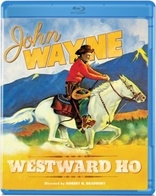
Movie rating
6.6 | / 10 |
Blu-ray rating
| Users | 3.5 | |
| Reviewer | 3.0 | |
| Overall | 3.0 |
Overview
Westward Ho (1935)
As a youngster John Wyatt saw his parents killed and his brother kidnapped. On a wagon train heading West he meets his brother who is now a spy for the gang which originally did the dirty work. He and his brother both fall for Mary Gordon.
Starring: John Wayne, Sheila Bromley, Frank McGlynn, Jr., Glenn StrangeDirector: Robert N. Bradbury
| Western | Uncertain |
| Drama | Uncertain |
| History | Uncertain |
Specifications
Video
Video codec: MPEG-4 AVC
Video resolution: 1080p
Aspect ratio: 1.37:1
Original aspect ratio: 1.37:1
Audio
English: DTS-HD Master Audio Mono
Subtitles
None
Discs
25GB Blu-ray Disc
Single disc (1 BD)
Playback
Region A (B, C untested)
Review
Rating summary
| Movie | 3.0 | |
| Video | 3.5 | |
| Audio | 2.5 | |
| Extras | 0.0 | |
| Overall | 3.0 |
Westward Ho Blu-ray Movie Review
The beginning of a beautiful friendship.
Reviewed by Jeffrey Kauffman April 19, 2013When perusing the years perhaps overly optimistically called Hollywood’s Golden Era, film historians and film lovers alike tend to focus on the major studios, those glamour factories that churned out an incredibly high level of product that often blended art with commerce in unexpectedly excellent ways. Looking at the histories of Metro-Goldwyn-Mayer, 20th Century Fox, Paramount Pictures or Warner Brothers from the 1930s through the 1940s is like seeing the entire gamut of Hollywood’s proclivities in microcosm. Stars were made (and destroyed), new kids on the block became respected directors and writers, thousands of largely unrecognized technicians plied their crafts in relative anonymity but with unerring genius, while over it all intense autocrats like Louis B. Mayer, Adolph Zukor, Darryl F. Zanuck or Jack Warner lorded the power like a feudal king surveying his fiefdom. But there’s just as much, if not more, to be learned by investigating the so called minor studios, many of which were frequently gathered under the rubric “Poverty Row”. One of the most interesting of the minor studios, Republic Studios, was in fact created out of a coalition of other “Poverty Row” outfits in what was proposed by entrepreneur Herbert J. Yates as an innovative way to pool resources, production facilities and signed talent to create more viable product. Yates’ initial intention was to let the former independent studios now under his command operate as more or less standalone entities, but Yates soon fell victim to “warlord syndrome”, alienating the former executives who had been in charge of their own little fiefdoms before joining forces as Republic Pictures. Republic had a rather long history, at least as far as minor studios go, lasting for well over two decades and pumping out an amazing amount of films, many of which are now being released on Blu-ray by Olive Films. Among these are a lot of relatively early John Wayne entries. Though one of Republic’s acquisitions had already previously signed Gene Autry, Wayne came aboard courtesy of Monogram Pictures and was, with Autry, one of Republic’s semi-established names. According to the liner notes on the Blu-ray release of Westward Ho, this was the first ever film to be released by Republic Pictures and therefore began a long relationship between Wayne and the fledgling studio, one that would continue in one form or another for many more years, even after Wayne had made his name with the majors.
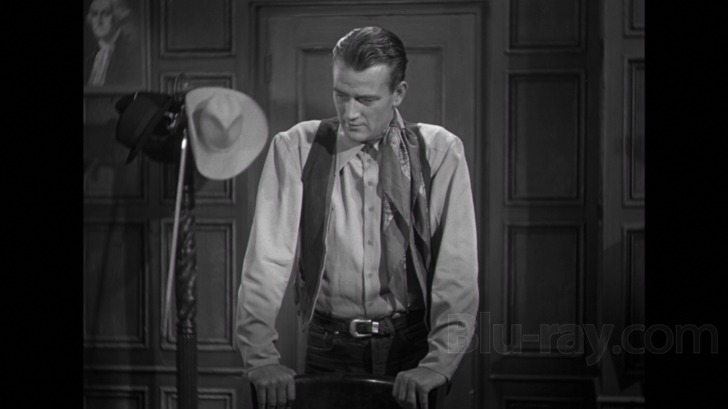
What’s fascinating about Westward Ho is how surprisingly artfully it reworks hoary tropes of westerns (and indeed other genres as will be discussed below) within its bargain basement ethos. Directed by journeyman Robert N. Bradbury, the film actually boasted a fairly lavish production by Republic’s (still nascent) standards, with some incredibly gorgeous location photography that captures some stunning high altitude peaks in the distance. The story of Westward Ho has been told time and time again and would (in a different timeframe and setting) become a standard trope in a number of gangster films in the 1930s and 1940s, where two brothers (or lifelong friends in some cases) end up on different sides of the law.
In the case of Westward Ho, we’re introduced to the Wyatt family, a hardy group of pioneers leading a large herd of cattle westward. The family is attacked by a group of bad guys who kill the parents and abduct the younger Wyatt son, thinking that the older Wyatt boy is dead. This sequence ends with a fantastic little moment where John Wyatt, the older boy who has indeed survived, stumbled up to the corpse of his mother on a barren western plain and lies down next to her as the remnants of the Wyatt wagon train burn in the background. It’s positively (John) Fordian and is quite remarkable for a film of this generally rote approach.
The film segues forward a decade or two (replete with that oft used technique of a montage of newspaper headlines and indications of passing years) where we find John Wyatt (John Wayne) now an adult out to restore law and order in a lawless west. Unfortunately, Wyatt can’t get the city elders to fund his proposal, and so he recruits a bunch of men who have had their own run ins with an ineffective justice system. Together they form a group which Wyatt informs them will be called Vigilantes, and just to make sure their little club is instantly identifiable, they all ride white horses and wear black outfits and (just in case that weren’t enough) they sing! Yes, this is yet another attempt to make Wayne a competitor to his then new studio stable mate Gene Autry. It’s patently silly, but if you’re of the right mind, it’s also more than a bit hilarious.
The rest of Westward Ho’s rather brief running time plays out in predictable fashion as John attempts to bring several bad guys to justice, reconnects with his long lost brother (who is of course now on the other side of the law), and attempts to woo a pretty little cowgirl (Sheila Bromley). The film may be predictable, but it’s also surprisingly enjoyable. Aside from the relatively lush production values, it’s interesting to see Wayne this early in his career, especially after the perceived debacle of The Big Trail. Unlike some of the later Republic films Wayne did, even some non westerns, there’s absolutely none of what would become Wayne’s trademark idiolect with its twang and tendency to drop “g”’s at the ends of words. This is a surprisingly articulate sounding Wayne, all the more remarkable in that the film is so bare bones and basic.
Despite its occasional silliness, Westward Ho is a remarkably entertaining feature, one that manages a surprising amount of depth in its short running time (about the same length as many of Wayne’s Three Mesquiteers “shorts”). Wayne is charming and dynamic, the supporting cast is generally good (if a bit hyperbolic at times), and the scenery is fantastic. Republic Pictures got off to a very good start indeed.
Westward Ho Blu-ray Movie, Video Quality 
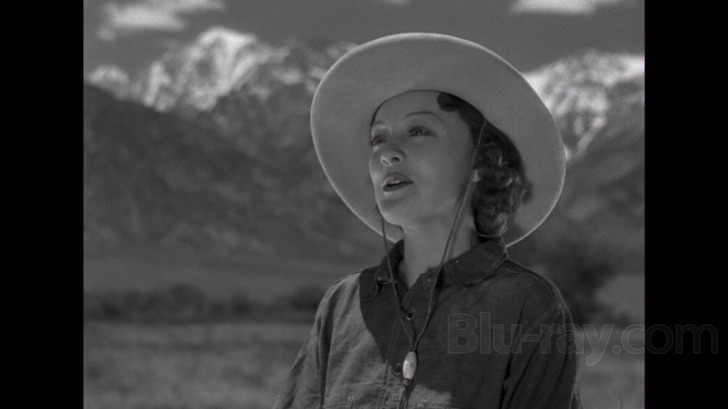
Westward Ho is presented on Blu-ray courtesy of Olive Films with an AVC encoded 1080p transfer in 1.37:1. The elements here have their fair share of minor damage, with occasional blemishes and a few negligible scratches along the way, but overall things look quite good, especially considering the age of the film. The biggest problem here is somewhat variable contrast, though the vast bulk of the film boasts extremely strong and consistent contrast. Some scenes, however, are slightly milky and washed out looking. The image is suitably crisp and decently well detailed, though as with most product churned out during this era on the cheap, there are few close-ups that could offer abundant fine object detail.
Westward Ho Blu-ray Movie, Audio Quality 
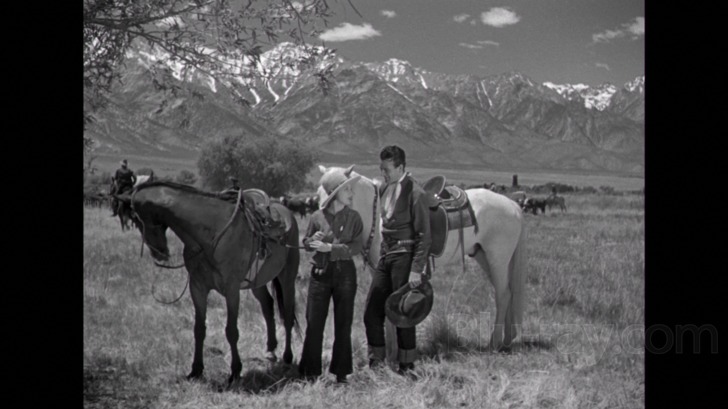
Westward Ho's lossless DTS-HD Master Audio Mono track does what it can with its source elements, but there's not much depth or nuance that can be squeezed out of these stems. There's a fair bit of distortion in the midrange here, with the high end also coming in for some lack of clarity from time to time (try as I might, I could not understand one word that child actor Dickie Jones said in the opening sequence of the film). Despite these issues, the majority of the film isn't overly problematic given reasonable expectations. The singing elements suffer from some typical boxiness, but dialogue sounds decent if not fantastic.
Westward Ho Blu-ray Movie, Special Features and Extras 
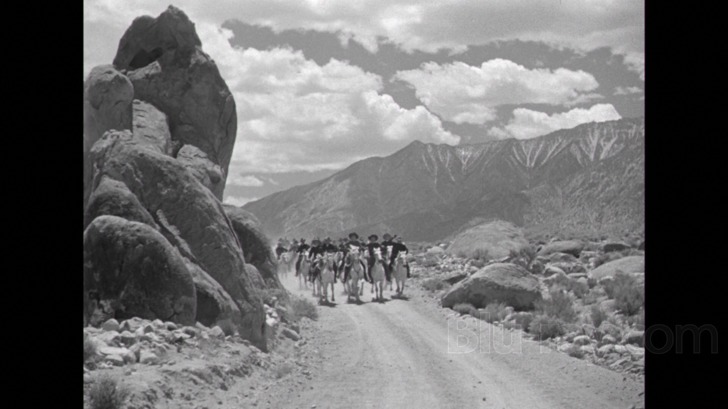
No supplements are included on this Blu-ray disc.
Westward Ho Blu-ray Movie, Overall Score and Recommendation 
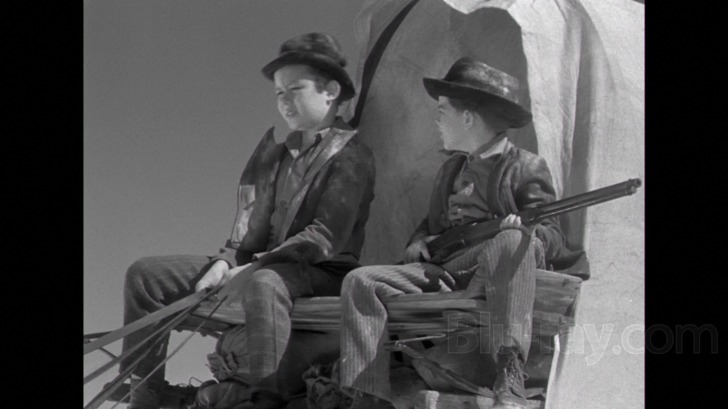
Westward Ho manages to escape its "programmer" roots rather handily, and while some elements are simply ludicrous (including a singing John Wayne), the film is really rather artful, especially when one considers its less than fulsome budget and quick shoot. The film features some nice supporting turns (that's future Frankenstein's Monster Glenn Strange as the blacksmith whom Wyatt recruits to the Vigilantes early in the film) and it has a surprisingly scenic ambience with some really lush looking location photography. This Blu-ray offers generally excellent video but sometimes problematic audio. Recommended.
Similar titles
Similar titles you might also like

The Duel
2016

The Salvation
2014

The Man Who Shot Liberty Valance 4K
1962

The Paleface
1948

War of the Wildcats
In Old Oklahoma
1943

Westward the Women
Warner Archive Collection
1951

The Outsider
2019

When the Daltons Rode
1940

The Man from the Alamo
1953

The White Buffalo
2K Restoration
1977

The Cimarron Kid
1952

Cheyenne: The Complete Series
Warner Archive Collection
1955-1962

Posse
50th Anniversary Edition
1975

The Train Robbers
1973

Dodge City
1939

Hang 'Em High
50th Anniversary Edition | Shout Select #57
1968

The Ox-Bow Incident
1943

Duel in the Sun
Roadshow Edition
1946

Horizon: An American Saga - Chapter 1
2024

Forsaken
2015